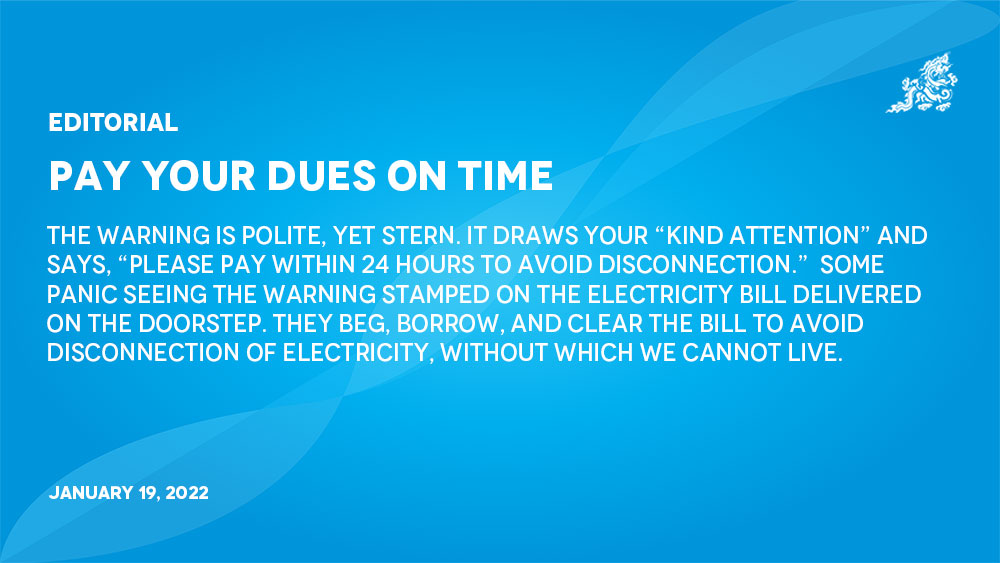The warning is polite, yet stern. It draws your “kind attention” and says, “Please pay within 24 hours to avoid disconnection.” Some panic seeing the warning stamped on the electricity bill delivered on the doorstep. They beg, borrow, and clear the bill to avoid disconnection of electricity, without which we cannot live.
The other warning is no different. Please pay to avoid penalties and disconnection, it says. This is with regards to drinking water. The message is to pay your bills or starve.
We have to pay our bills for goods and services we have availed. Whether it is water, electricity, or other services, we have to pay, and pay on time. But besides the utility bills, clearing dues in the country is a big problem.
It takes time to pay the tailor for the cloth bags he stitched for the “important” international conference, or the petty contractor who completed a retaining wall, or the announcement an organisation made through local media. Quite often, the bills are delayed or not paid, burdening those who provided services or goods.
Delaying payment or not paying at all for goods and services provided is deeply rooted in our system. While some may be for genuine reasons like not having documents or issues related to delay and quality, many feel that the government and their agencies and officials are deliberately delaying payment for many reasons. It is said that an accountant can delay payment for jobs done for months. It is easier if the official is given a cut, no matter how big or small.
When government agencies delay payment with no rhyme or reason, people start getting suspicious. It is said that procurement officers are the richest civil servants in the country. While it may not be true, the assumption arises from how they deal with suppliers of goods and services.
While service providers like the Bhutan Power Corporation, the thromdes, and the two telcos have the upper hand of disconnecting services for bills not paid, there are many service providers who cannot resort to the same tactics. Advertisement is a good example. A local media firm cannot threaten or warn an agency for not paying its dues. They have the upper hand. If the media say they will not carry future advertisements, the agency will have the last laugh. But it is not ethical or right not to pay what is due.
The private sector depends on the government for work. They cannot threaten an agency or a ministry to pay their bills. They need jobs and even if they have fulfilled all the requirements, they cannot warn government agencies. This leaves room for corruption.
Amidst the pandemic, the procurement rules and regulations are simplified to ensure transparency, timeliness, cost-effectiveness, and efficiency.
Bureaucratic procedures in awarding work are reduced. For instance, projects should be evaluated and awarded within three days of the opening of the bids. Submissions of bids are reduced from five to three days. Work up to Nu 1.5M can be awarded through community contracting methods. These are welcome changes. The problem is after the work is done.
When payment is delayed, suppliers, contractors, and other businesses resort to other means to get their money. The government is the biggest client and they have to rely on the government. They wait or beg for the payment that is rightfully theirs. This is risky.
The pandemic has shown us that a lot of services have to be catered to with urgency. If government agencies are not paying what is due, it could breed corruption. Delayed payments from government agencies can derail the plans and priorities of the private sector and the state-owned enterprises.
Perhaps the next rule should be penalizing government agencies for not clearing their dues. This could enhance service delivery and fix accountability.


